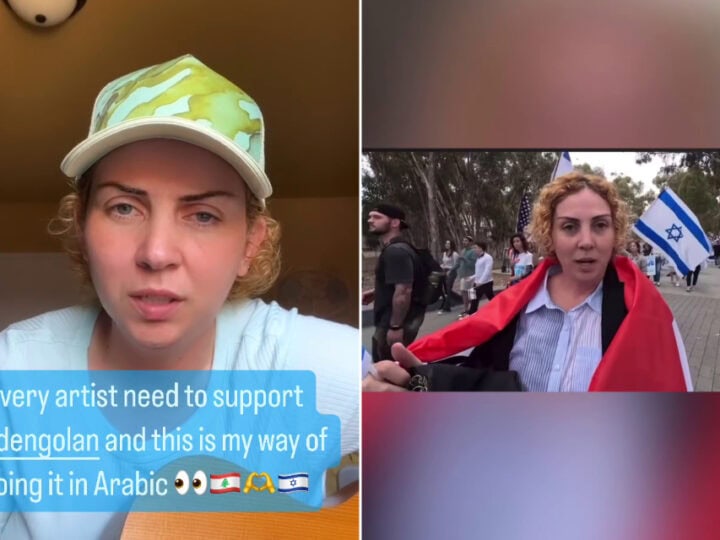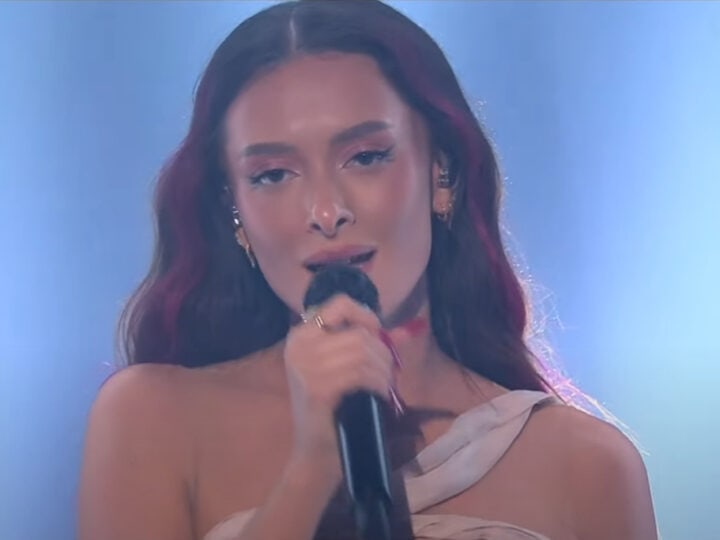The October 7 attacks and the subsequent war in Gaza have forced Israel to wage diplomatic battles on multiple fronts, from social media to academia and culture.
One of the battlefields happens to be the Eurovision Song Contest, which takes place this May in Malmö, Sweden.
Being a campy, Eurodance extravaganza, Eurovision may seem like the most unlikely of settings for such a complex geopolitical fight.
But if we look into the contest’s history, we would see that it has always been political. Yet somehow, extremely beloved by Israeli audiences.
Us against the world mentality
“Israelis generally love international events where they get to cheer on the country,” Akiva Novick, who has been commentating on the contest for Israel since 2020, tells ISRAEL21c.
“Israel often makes international headlines for the wrong reasons, so Israelis love when the country’s name comes up under positive circumstances,” he adds.
Novick is a journalist with Israel Broadcasting Authority’s (IBA) KAN outlet, which broadcasts Eurovision as an active member of the European Broadcasting Union (EBU) that owns and operates Eurovision.
“Every event that involves our flag is interpreted as a national mission by the public. There’s an emotional element to it for us because we’re very patriotic,” adds Mor Lev, a singer and content creator.
Lev is a fellow KAN employee who runs all Eurovision-related social media channels for KAN.
The two say that following the October 7 attacks, there was some talk of skipping the competition this year entirely. That is, until anti-Israel voices began calling for the country to be disqualified by the EBU, similar to Russia’s disqualification following the invasion of Ukraine.
“The moment they started calling for Israel to be disqualified, we said, ‘Now we have to compete,’” Novick adds.
But deciding to compete was only the start of the struggle.
October Rain
At the beginning of February, Eden Golan won “The Next Star for Eurovision” reality show, securing her place as Israel’s representative at the competition.

A few weeks later, the Israeli delegation submitted its official song entry to the EBU, titled “October Rain,” written by Keren Peles, Avi Ohayon and Stav Beger, which referenced the Hamas attack on Israel on October 7.
The entry was immediately rejected over its alleged political messaging, kickstarting a lengthy back-and-forth between the EBU and the IBA. After weeks of remaining defiant, and the intervention of President Isaac Herzog who thought it imperative for Israel to take part, the IBA agreed to change the lyrics, and renamed the track “Hurricane.”
Lev believes the EBU exhibited signs of hypocrisy during the debacle, especially in light of Ukrainian song entries in recent years.
He adds, however, that generally the EBU does stick to its rules.
“In 2009, Georgia submitted a song entry called ‘We Don’t Wanna Put In,’ [referencing Russian President Vladimir Putin]. The EBU told them to change the lyrics, but they didn’t and got disqualified,” notes Lev.
In 2021, Belarus was also disqualified after its song entry appeared to mock protestors, demonstrating against President Aleksandr Lukashenko. “They were not only disqualified, but banned for three years from participating,” Lev says.
In addition, Lev explains that while Russia is perceived as a common enemy of all Europe, it’s much more complex with Israel.
“We gained much more from changing a couple of words in that song than what we would’ve lost from sticking to it. It would not have been worth breaking off our relationship with the EBU over it.”
Pandora’s box of trouble
The relationship between the EBU and the Israeli public would have also become strained for years to come, explains Lev.
“Israel loves Eurovision, and Europe generally loves what we have to offer — from our sound to our language. Disqualification would have made the Israeli public very angry with the EBU.”
In addition, Lev explains, it was important not to set a precedent of international disqualifications for Israel.
“There are elements that are already working to disqualify us from the 2024 Paris Summer Olympics. That is a direct result of the discourse surrounding Eurovision,” he notes.
“Also, think about the international headlines. No one would have said that Israel was disqualified because it refused to change the lyrics. They would have said, ‘Israel was kicked out because of the war.’
“It’s Pandora’s box of trouble!”
Against all odds
It’s no secret that the odds of Israel actually winning Eurovision during such a politically charged year are slim. At the moment, the bookmakers are placing Golan as the eighth overall favorite to win.
“Israel has been quite successful at Eurovision. We’ve been taking part in it for 50 years and won four times.
“Even if this year we’re not going to win, to see the word, ‘Israel,’ flash up on that stage would be a win for us,” claims Lev.
Novick adds the fact that this year’s event is taking place in Malmö, where over 20 percent of the population is Muslim, may add to hostility towards the Israeli contestant. “It’s a big security operation [for Israel],” he says.
Lev, who has been a Eurovision aficionado since he was a child and attended the contest on multiple occasions, believes at the end of the day those calling for an Israeli boycott are a “radical, brainwashed minority.”
“The sane majority is waiting for things to get back to normal, waiting until it becomes okay to love Israel again.”

The recent kerfuffle surrounding Israel’s participation in the 2024 Eurovision Song Contest has left some wondering why a Middle Eastern country is taking part in a European contest in the first place.
“We belong in Eurovision,” Mor Lev, who runs all Eurovision-related social media channels for the Israel Broadcasting Authority (IBA), tells ISRAEL21c.

















